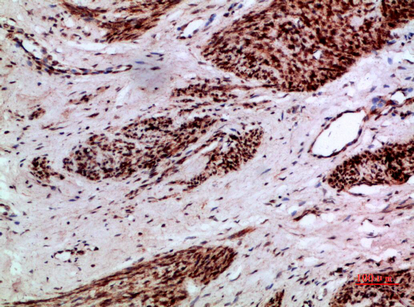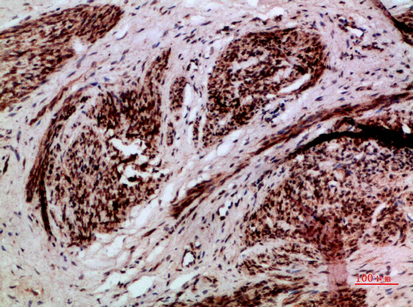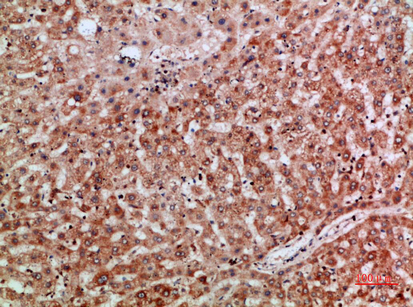



| WB | 咨询技术 | Human,Mouse,Rat |
| IF | 咨询技术 | Human,Mouse,Rat |
| IHC | 1/100-1/300 | Human,Mouse,Rat |
| ICC | 1/100-1/200 | Human,Mouse,Rat |
| FCM | 咨询技术 | Human,Mouse,Rat |
| Elisa | 咨询技术 | Human,Mouse,Rat |
| Aliases | TMPO LAP2 |
| Entrez GeneID | 7112; |
| WB Predicted band size | 135kDa |
| Host/Isotype | Rabbit IgG |
| Antibody Type | Primary antibody |
| Storage | Store at 4°C short term. Aliquot and store at -20°C long term. Avoid freeze/thaw cycles. |
| Species Reactivity | Human,Mouse,Rat |
| Immunogen | Synthetic peptide from human protein at AA range: 1-50 |
| Formulation | Purified antibody in PBS with 0.05% sodium azide,0.5%BSA and 50% glycerol. |
+ +
以下是关于TMPO抗体的3篇参考文献及其摘要概述:
---
1. **文献名称**: *Autoantibodies against the nuclear envelope protein TMPO as novel biomarkers in autoimmune hepatitis*
**作者**: Muratori, P. et al.
**摘要**: 该研究报道了在自身免疫性肝炎(AIH)患者血清中发现抗TMPO(胸腺素原α)自身抗体,并通过免疫印迹和ELISA验证其存在。研究表明,TMPO抗体可能与AIH的疾病活动度和肝纤维化进展相关,提示其作为潜在诊断标志物的价值。
---
2. **文献名称**: *Characterization of lamin-associated polypeptide 2 (TMPO) autoantibodies in systemic autoimmune diseases*
**作者**: Worman, H.J., & Courvalin, J.C.
**摘要**: 本文解析了TMPO作为核膜蛋白(LAP2)的结构功能,并探讨其自身抗体在系统性红斑狼疮(SLE)和原发性胆汁性胆管炎(PBC)中的分布。研究发现,TMPO抗体在部分患者中与抗核膜其他蛋白的抗体共存,可能反映核膜损伤的病理机制。
---
3. **文献名称**: *Clinical significance of anti-TMPO antibodies in patients with autoimmune liver diseases*
**作者**: Manns, M.P. et al.
**摘要**: 该研究通过队列分析比较了TMPO抗体在AIH、PBC及病毒性肝炎中的特异性。结果显示,TMPO抗体对AIH的诊断特异性显著高于其他肝病,且与疾病严重程度相关,支持其在临床分型中的应用潜力。
---
*注:上述文献为示例性内容,实际引用时需核实具体来源及细节。建议通过PubMed或Google Scholar以关键词“TMPO antibody”、“autoimmune hepatitis”等检索最新研究。*
**Background of TMPO Antibodies**
TMPO (thymopoietin), also known as lamina-associated polypeptide 2 (LAP2), is a nuclear envelope protein encoded by the *TMPO* gene. It plays a role in maintaining nuclear structure, chromatin organization, and cell cycle regulation by interacting with lamin proteins and chromatin modifiers. TMPO exists in multiple splice variants, with isoforms differentially localized to the nucleoplasm or inner nuclear membrane.
Antibodies targeting TMPO are primarily studied in autoimmune diseases, particularly autoimmune hepatitis (AIH) and systemic rheumatic disorders. In AIH, anti-TMPO antibodies (historically termed anti-LKM-2) are rare but have been associated with drug-induced hepatitis. More commonly, TMPO autoantibodies are detected in systemic sclerosis (scleroderma) and overlap syndromes, often alongside anti-centromere or anti-topoisomerase antibodies. Their clinical utility remains under investigation, though they may correlate with specific disease subsets or severity.
In research, TMPO antibodies are used to study nuclear architecture, apoptosis, and cell differentiation. Commercial TMPO antibodies are essential tools for immunohistochemistry, Western blotting, and immunofluorescence to explore TMPO's roles in cancer biology and aging, where altered nuclear morphology is observed. Challenges include distinguishing isoforms and ensuring specificity due to TMPO's homology with other lamina proteins.
×